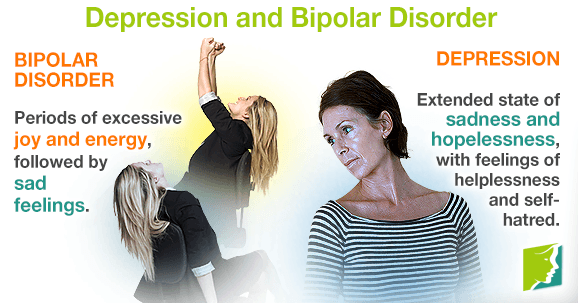Depression and bipolar disorder are serious psychological illnesses that can have deep and profound effects on people's lives. This means people can often get them confused with one another, even medical professionals, sometimes resulting in patients being misdiagnosed and not getting the help they need. Read on to find out more about the signs and symptoms of depression and bipolar disorder.
Bipolar Disorder
This illness was previously known as manic depression, and is characterized by radical mood swings in which the sufferer is often unable to feel a "normal" mood, but instead will have periods of feeling extremely high and energetic – a mania – followed by periods of feeling incredibly low and lacking in energy or depression.
Around 2% of the U.S. adult population suffers from this disease, and it is thought to have a genetic basis, with the chances of developing the condition greater if a close family member has it. A manic period has to last for at least a week in order to be diagnosed. However, there are certain symptoms that are characteristic of the manic periods, and these distinguish bipolar from regular depression:
- Feeling unusually “high” and optimistic
- Unrealistic, grandiose beliefs about oneself
- Not needing much sleep to function
- Feeling extremely energetic
- Rapid talking
- Racing thoughts
- Easily distracted
- Extreme impulsiveness
Depression
Depression is a mental illness in which the sufferer has to endure a chronic feeling of sadness and hopelessness, which can get worse over time if left untreated. Over time, the person might become socially withdrawn, experience a change in personality, or maybe become more aggressive.
Psychological symptoms include social withdrawal, uncontrollable tears, and even suicidal thoughts. As well as these, those afflicted also bear undesirable physical symptoms, such as a lower sex drive, unexplained aches and pains, and fatigue. A few of the commonly-reported symptoms are:
- Feelings of helplessness and hopelessness
- Loss of interest in hobbies
- Appetite or weight changes
- Sleep changes
- Irritability
- Loss of energy
- Self-loathing
- Concentration problems
- Unexplained aches and pains
In some ways, bipolar disorder and depression mirror each other, but there are marked differences between the two. Bipolar disorder has to last a week to be officially diagnosed, and so it is worth keeping an eye on depression in the long term in order to see if bipolar might be a more accurate diagnosis. However, it is important to speak to your doctor about any behavioral changes, and avoid self-diagnosis.
Sources
- National Health Service UK. (2014). Bipolar disorder. Retrieved October 16, 2014, from http://www.nhs.uk/conditions/bipolar-disorder/pages/introduction.aspx
- National Health Service UK. (2014). Clinical depression. Retrieved October 16, 2014, from http://www.nhs.uk/conditions/depression/pages/introduction.aspx
- National Institute of Mental Health. (2012). Bipolar Disorder in Adults. Retrieved October 16, 2014, from http://www.nimh.nih.gov/health/publications/bipolar-disorder-in-adults/index.shtml




